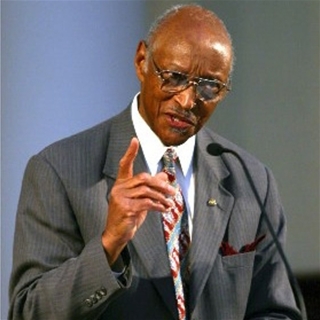 I cannot speak highly enough of James Earl Massey, the famed preacher and homiletician who went home to be with the Lord last year. I was privileged to get to know him a bit during my Doctor of Ministry studies at the Beeson Divinity School and was honored to have him sit on my final project committee. I consider James Earl Massey to have been a great scholar, a true gentleman, a uniquely gifted preacher, and, most of all, an example of what a Christian should be. He was a model of humility and integrity and will be sorely missed.
I cannot speak highly enough of James Earl Massey, the famed preacher and homiletician who went home to be with the Lord last year. I was privileged to get to know him a bit during my Doctor of Ministry studies at the Beeson Divinity School and was honored to have him sit on my final project committee. I consider James Earl Massey to have been a great scholar, a true gentleman, a uniquely gifted preacher, and, most of all, an example of what a Christian should be. He was a model of humility and integrity and will be sorely missed.
I entered his name into Amazon a few weeks ago and noticed the Kindle version of his 1960 book, When Thou Prayest. I’m so glad I did! It is vintage Massey: beautifully written, wise, insightful, not derivative, and evidencing a life of practice behind it.
I recall once at Beeson an interesting moment in which a young lady asked Dr. Massey if he would share some of his own devotional practices. He responded kindly but a bit, to me, surprisingly, that he preferred not to at that time, given the personal nature of the topic. It did not strike me as rude. On the contrary, it struck me as strangely refreshing in our day of over-exposure. Even so, it was an interesting moment. I thought of that exchange when I saw this book because it occurred to me that I would now get to hear the answer that the young lady who asked the question, and that all of us who were in that room, wished to hear.
The book is brief, but profoundly impactful. Let me just share a few highlights to give a sense of what the book is like:
One of the teachings of Jesus on prayer begins with the words, “And when thou prayest. . . .” Thus we understand from Jesus himself that prayer is a necessary and normal action for men. No man is truly normal who does not pray. The Christian who does not take time regularly to hold communion with God by means of prayer is not at his best. (Kindle Locations 123-126)
During prayer, we are critically searched in the light of God. But that searching is necessary to lead us to strength. The feeling of emptiness is necessary to create hunger for the needed filling. It was to this that Jesus referred when he stated, “Blessed are they which do hunger and thirst after righteousness: for they shall be filled” (Matt. 5:6). Here in large part is both the pain and the pleasure of prayer: the encounter always includes an examination of us. But as the needed searching takes place, the fact of God’s fatherhood assures our spirit. (Kindle Locations 156-160)
Without a forgiving spirit, prayer is but failure. We must not presume to hold a moment before God when we act in meanness toward others. (Kindle Locations 542-543)
One thing I appreciated about this book was the balance between theology and practice. It was at some points poetic and theoretical and other times imminently practical. For instance, consider Massey’s advice on how to fight distractions when we pray:
Step 1. Plan your prayer period to grant sufficient time for the quieting of your mind. Do not always rush into prayer. Silence should help to settle you; then the tensions of the body can subside and the pressures in the mind diminish.
Step 2. Find a place that lends itself well to prayer. Jesus had this in mind when he instructed, “But thou, when thou prayest, enter into thy closet, and when thou hast shut thy door, pray . . . .” (Matt. 6:6).
instructed, “But thou, when thou prayest, enter into thy closet, and when thou hast shut thy door, pray . . . .” (Matt. 6:6).
Step 3. Set yourself to pray. Let your purpose be stronger than any pressures that you feel. The reach of the soul should finally subdue any initial rambling of the mind.
Step 4. Assume a bodily position that will not soon cause you to be fatigued. The position of the body is often a distracting feature itself.
Step 5. Follow some creative procedure. Use some reliable guide for the mind during the time before God.
Rehearse some Scripture verses; read until you feel the thrust of the whole occasion. Softly sing some hymn or meditate over some Christian poetry until its message fully captures your attention. Then give that centered attention to God.
Step 6. Develop the ability to concentrate. Concentration is the ability to be attentive. It takes concentration to reduce mental images to a minimum for attentive prayer. (Kindle Locations 381-394).
The book also contains some memorable turns of phrase. For instance, Massey encourages the Christian who is struggling with the inadequacy of his or her words in prayer to remember that “even when we are disturbed because our plea is not fully sound, he looks beyond our statements and answers our state” (Kindle Locations 178-179). Beautiful! Also, I was struck by Massey’s two references to prayer as “a privileged tryst” (Kindle Locations 139-140 and 207). What an evocative and profound image!
When Thou Prayest is a tremendous and insightful little introduction to prayer that will challenge, encourage, and guide the reader into a much-needed reflection on this important aspect of the Christian life. Highly recommended!
